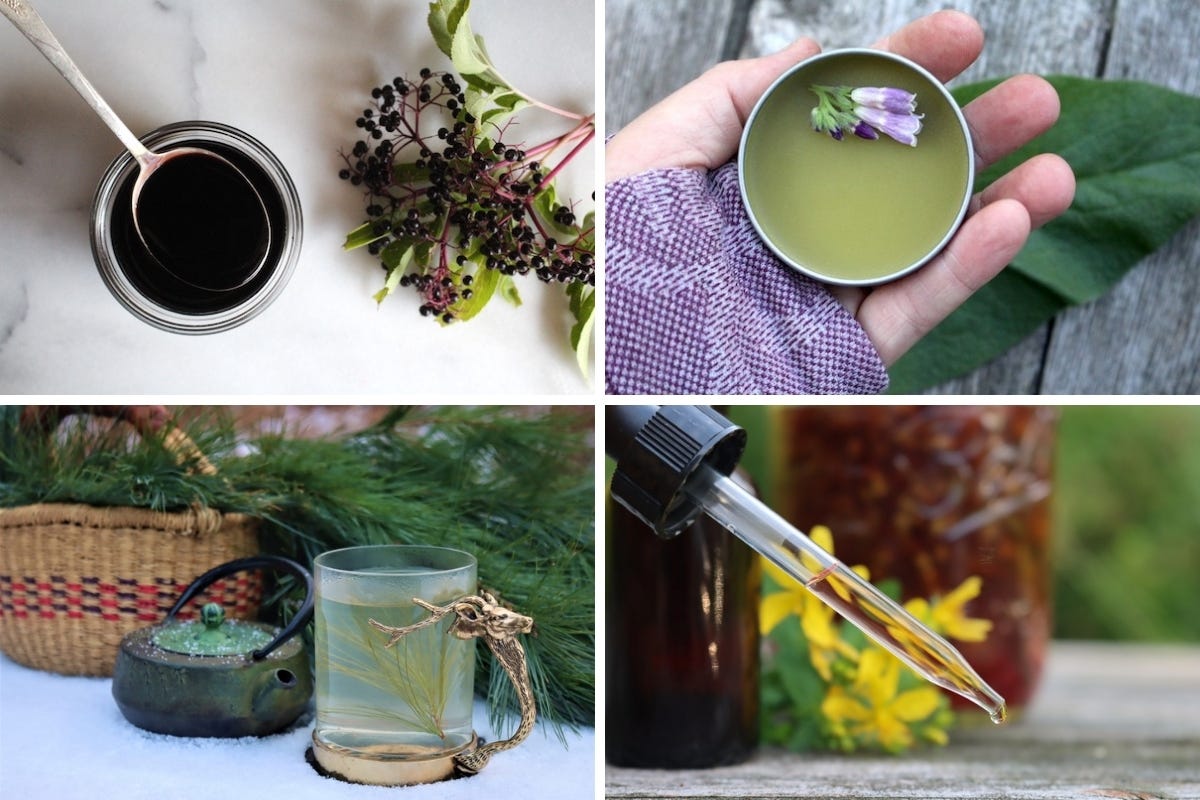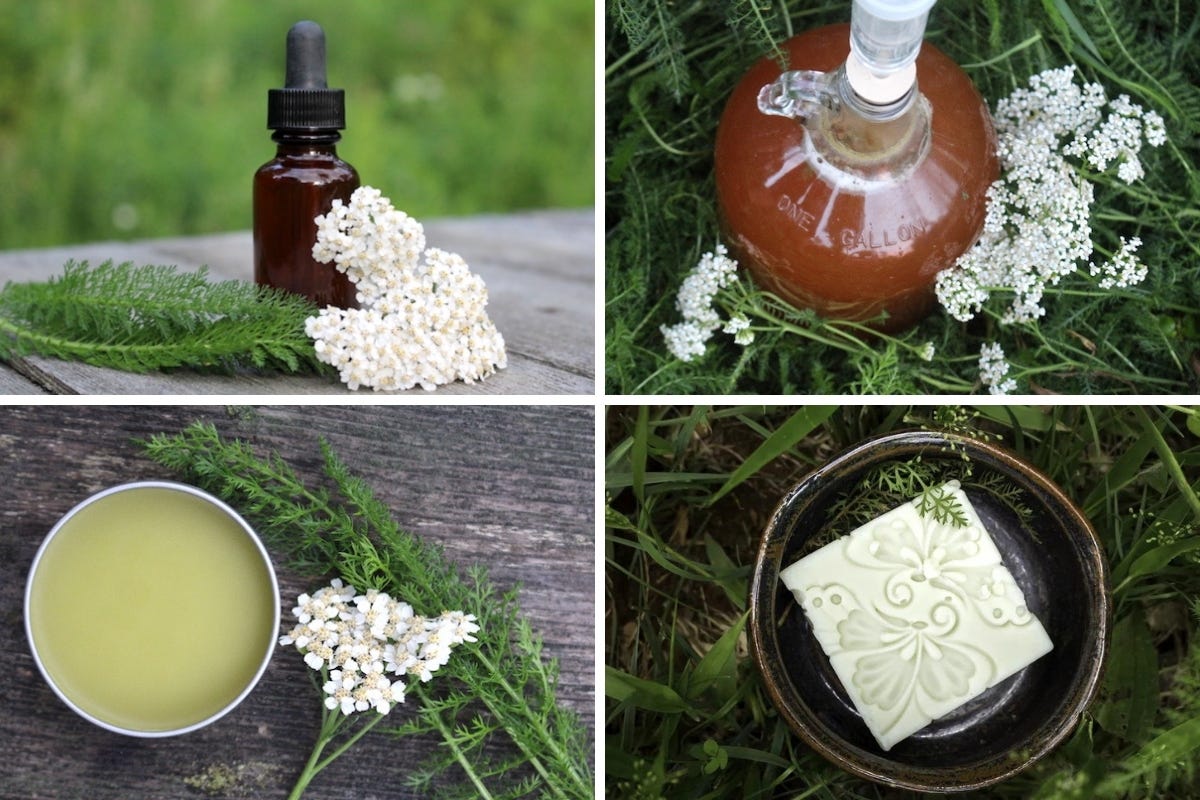Herbal Medicine making isn't just about finding the right herb, it's also about finding the right herbal preparation to use the herb appropriately. From teas and tinctures to salves and soaps, there's a finding the right preparation can be tricky.
Chances are, even as an experienced home herbalist, there are quite a few herbal preparations you've never tried (and maybe never even heard of).

Making herbal remedies is a bit like baking in some ways. In the kitchen, the same simple ingredients can make anything from cakes to cookies and scones to sourdough. They're all served in different ways and have their own place in a meal.
When preparing medicinal plants, you have a lot of choices in your home apothecary.
Most people are familiar with herbal teas, but there are actually a number of different ways that herbs are used medicinally, both topically and internally.
Some herbs are best used topically, while others work best in teas. Some have water-soluble medicinal properties, while others need the alcohol from a tincture or to be infused into oil for extraction.
The medicinal actions of some herbs change based on the preparation.
The herb yarrow, for example, is used to stop bleeding and prevent infection when used topically as a yarrow salve. When taken as tea, it's used internally to treat symptoms of colds and flu.
The tea isn't going to help your skinned knee any more than the salve is going to help your cold. It's all about finding the right herbal preparation.

This newsletter may contain affiliate links.
Types of Herbal Preparations
This basic list of herbal preparations covers the most common ways herbs are administered. I'll go through each in detail shortly.
Not every preparation is used with every herb, but here's a basic overview of some of the choices available:
Fresh/Dried Herbs - Many herbs can be eaten right out in the garden, or added as dried herbs to simmering cook pots in the kitchen.
Herbal Capsules - A convenient way to take dried herbs, herbal capsules allow for easy dosing.
Tea - Made by adding herbs to hot water, tea is one of the simplest herbal preparations.
Infusion - A strong tea made with either hot or cold water. They're often allowed to steep for many hours.
Decoction - A very strong herbal tea made by reducing the "tea" often by as much as half its original volume to concentrate the medicinal constituents.
Herbal Broth - Often made with medicinal mushrooms, or by incorporating herbs into traditional slow-cooked bone broths.
Herbal Steams - A bit like a tea, in that boiling water is poured over herbs, but instead of drinking it you inhale the steam which is filled with the volatile oils of the herbs. This is especially useful for respiratory conditions. This method is also sometimes used on other parts of the body, such as tender parts after childbirth when they're still too injured to apply a compress.
Poultice - Herbs are finely chopped or pulverized completely before topical application.
Tincture - An alcohol extract of fresh or dried herbal material. Most are single extraction tinctures made with just alcohol, but some use a double extraction method that first extracts with alcohol and then water to pull out both the water and alcohol soluble constituents.
Herbal Glycerite - Similar to a tincture, a glycerite uses vegetable glycerine instead of alcohol to create a herbal extract. They're mostly used in children or individuals avoiding alcohol.
Herbal Sprays ~ Usually similar to a tincture, but put into a spray bottle for topical use. Some of the most common are throat and mouth sprays, which are alcohol-based extracts put into spray bottles for topical use on the mouth and throat. There are other sprays used topically elsewhere for wound treatment and skin conditions as well.
Infused Oil - Dried herbs are infused into a carrier oil, which can be used internally or externally. It's most commonly applied topically or used to make herbal soaps, salves, or cosmetics.
Herbal Salve -Made by adding wax to a herbal infused oil to create a semi-solid herbal preparation that's easy to apply topically.
Herbal Soap - Often made with herbal infused oil, a herbal soap is used topically to disinfect or treat skin conditions.
Bath Salts, Bath Bombs, and Sitz Baths - One big group of herbal preparations that rely on sitting in a herbally infused bath. While bath bombs and salts usually mean a full-body immersion in a tub, sitz baths are usually shallow water immersions for just one part of the body.
Infused Vinegar - Vinegar is used to preserve herbal material, and extract its medicinal components similar to a tincture.
Infused Honey - A small amount of dried herbal material is added to honey and allowed to infuse. Usually 1 part herbs to 2-5 parts honey by volume.
Herbal Fermented Honey - When you add fresh herbs to honey (instead of dried), the herbs begin to ferment in the honey creating something that's somewhere between mead and syrup. The fermentation makes some herbs more bio-available and helps to preserve them at the same time.
Oxymel - A mixture of herbs, vinegar, and honey that's taken as a syrup. They're generally a bit more pleasant than straight herbal vinegar.
Herbal Syrups - Herbs are simmered with water and sugar or honey to create a sweet medicinal syrup.
Herbal Cough Drops & Lollypops - In this preparation, herbs are cooked with sugar and honey to make hard candy that can be used as cough or throat drops.
Candied Herbs - Sometimes, the herbs themselves are candied for preservation. Good examples are candied ginger and candied angelica, where the whole herb is immersed in sugar until it's fully preserved.
Jellies, Jello & Gummies - These preparations are particularly suited to young children, who may not want to take their medicine but can be convinced to eat herbal jello for a sore throat or take elderberry gummies to help with a cold. In some cases, the natural gelatin that holds them together also has therapeutic effects too.
Electuary - A mix of honey and dried herbs, where enough dried herbal material is added so that the electuary can be formed into herb and honey packets or pills. It's mostly herbal material, just held together with honey.
Compress - A cloth is soaked in a cool herbal infusion and then applied topically.
Formentation - A cloth is soaked in a strong hot infusion and then applied topically. Similar to a compress, but applied warm so the heat is part of the treatment. They're most commonly used for pain relief.
Succus - The freshly expressed juice of a herb, this preparation spoils quickly. It was commonly used in the 1800s and before, when people visited the apothecary to have fresh preparations made on the spot. It's not commonly used anymore because it's not shelf-stable, so you won't find it in the pharmacy. They can, however, be made simply at home.
Lacto-Fermented Herbs - Fresh green herbs can be lacto-fermented, much like sauerkraut.
Herbal Wine and Mead or Herbal Beer - Historically, herbal beers were one of the more common herbal preparations. Back when everyone was brewing at home, instead of hops you might add various herbs which served to flavor and preserve the beer but were also intended for medicinal benefit. High-quality distilled alcohol for tinctures may have been expensive, but any peasant could harvest wild grapes and wild herbs, combing them for homemade medicine.
Read More: 20+ Types of Herbal Preparations to Make At Home
Often in herbal preparations, herbs are mixed to complement and amplify the medicinal actions. If you're interested in developing your own herbal formulations, I'd recommend taking this online course in Mastering Herbal Formulations from the Herbal Academy.
Looking for more?
The archives have over a hundred herbal medicine articles for you to discover.
What are your favorite herbal preparations? Leave me a note in the comments!
(Comments only, please. Emails tend to get lost in my inbox, and as much as I’d love to get back to each and every one, my screen time is very limited…and things fall through the cracks, and emails get buried in my inbox. If you comment here, they’re all in one place, and it’s much easier to get back to every single one.)
Until Next time,
Ashley at Practical Self Reliance




I make elderberry tinctures using spices and honey
I often wonder about whether an herb is as effective in, let's say, a tincture vs. a capsule, especially if something tastes awful...add that to vodka and it can be bad! The Middlebury co-op only sells dried burdock root in kind of a minced size, but I want to take it as a capsule. It takes FOREVER to try and grind it up in my coffee grinder, so I wonder whether it would be better to use it as a tincture...but, yuck!